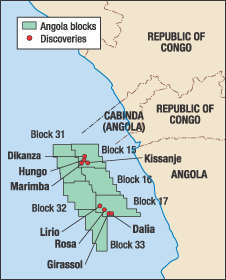Oil country hot line
Jan. 2002 Vol. 223 No. 1 Hot Line Russian cuts propel OPEC to retain decision OPEC apparently is closer to making a 1.5-million-bopd reduction, to help
Russian cuts propel OPEC to retain decision OPEC apparently is closer to making a 1.5-million-bopd reduction, to help curb slumping oil prices. This move was prodded by Russia’s delayed decision to reduce its oil exports by 150,000 bpd. Russian Prime Minister Mikhail Kasyanov said, "We count on the other oil suppliers, which have already made a decision (to reduce output), that they will in fact carry them out" and help support prices. Qatari Oil Minister Abdallah al-Attiyah said, considering that OPEC producers control only 35% of the market, the group is unable to influence global oil prices on their own. He added that if non-OPEC producers fail to cooperate in reducing output, members may choose to leave the cartel. Such action could send oil prices plunging to $5/bbl. OPEC said it will reduce output by 1.5 million bopd early this year, dependent upon non-OPEC producers (including Russia, Norway and Mexico) reducing volumes by 500,000 bopd. The cartel has already secured support of several non-OPEC countries, whose combined cuts total 440,000 bopd. Mexico offered to cut 100,000 bopd and Norway’s reduction is expected to at least match the size of Russia’s curbs. Angola had yet to provide exact figures for its output trims. However, it plans to make a decision this month. Senate Democrats outline energy package Last month, Senate Democrats framed a bill that prepares the way for a battle this year over Arctic drilling. The measure requires greater use of renewable energy, including corn-based ethanol, and subsidies to push construction of a natural gas pipeline in Alaska. Senate Majority Leader Tom Daschle (Democrat-South Dakota) said some Democratic senators feel very strongly that the Arctic National Wildlife Refuge must remain protected, but he urged Republicans not to hold all energy policy hostage over the issue. Embattled Enron begins restructuring First was the exposure and SEC investigation of Enron’s off-balance financial records, then came smaller rival Dynegy’s pull-out from a proposed rescue merger, followed by layoffs and lawsuits. Now, finally, the former stock market darling has begun painful strides on the road to restructuring the financially paralyzed company. First, Enron was able to secure a $1.5-billion emergency loan from key lenders, JP Morgan Chase and Citigroup. Also, the firm was awaiting approval for what would be the biggest bankruptcy protection in U.S. history. Moreover, Shell has expressed a keen desire to purchase Enron’s LNG terminal in India. This proposal comes just as the Houston-based firm desperately struggles to come up with cash to meet mounting debt repayments, and to continue skeleton operations. Eastern GOM sale 181 yields 190 bids In the first sale of federal leases offshore Florida in more than a decade, 14 exploration firms made 190 bids for 95 tracts in the 1.5-million-acre area in the eastern Gulf of Mexico. Companies issued $340.5 million in high bids. Anadarko Petroleum had the most high bids, totaling $167.4 million on 28 tracts, followed by Shell Offshore with $127.9 million in winning bids on 28 tracts. Meanwhile, opponents of the sale, concerned about the effects of such drilling on the state’s tourism industry, promised additional action, legal and political, to keep sites from being developed. API’s Betty Anthony noted that the industry had compiled "a solid record of stewardship" while drilling in other GOM areas. The sale "sends a strong signal" that the petroleum industry is "committed to developing secure domestic energy sources," said API. Angola records unusual dry well Angola’s first ultra-deep, offshore exploration well failed to produce even moderate oil shows, reported industry sources in Luanda. The large province lies in water depths of more than 4,920 ft, where only remote-controlled, deep-sea robots can operate. The well targeted the huge Jupiter prospect in the BP-operated Block 31, to depth of about 6,100 ft. There are still high expectations of finding commercial fields in the block, considering the country’s drilling success rate of about 85%, compared to the global average of only 50%. The country’s production is expected to rise to 860,000 bopd this year, as the giant Girassol project in Block 17 goes onstream. The government expects production to continue to increase, reaching 1.3 million bopd by 2005.
Contracts awarded for Caspian development Six major contracts, totaling $780 million, were awarded to several firms for the development of Azerbaijan’s offshore Azeri Chirag and Gunashi fields, estimated to hold 600 million t (4.4 billion bbl) of oil. The contracts are part of a $3.5-billion investment in the fields through 2005, to start extracting and exporting large quantities of oil to market. Head of the operating consortium, David Woodward, said, "The signing of the six major contracts is a milestone which marks the commencement of construction activities." The contracts were awarded to McDermott, Bouygues Offshore, Emtunga International, Saipem and Eiffel. Iraq oil exports climb to 18.7 million bbl Representing one of the largest volumes of Iraqi crude exports under U.N. supervision in the past five years, is the country shipped 18.7 million bbl of oil during the week ending November 30, 2001. However, the price of Iraqi oil has fallen steadily since mid-September, and the country ended the U.N. oil-for-food program with a budget shortfall of about $1.7 billion. A new six-month phase has begun. Iraq was expected to submit a distribution plan to the UN last month. |
- Applying ultra-deep LWD resistivity technology successfully in a SAGD operation (May 2019)
- Adoption of wireless intelligent completions advances (May 2019)
- Majors double down as takeaway crunch eases (April 2019)
- What’s new in well logging and formation evaluation (April 2019)
- Qualification of a 20,000-psi subsea BOP: A collaborative approach (February 2019)
- ConocoPhillips’ Greg Leveille sees rapid trajectory of technical advancement continuing (February 2019)



